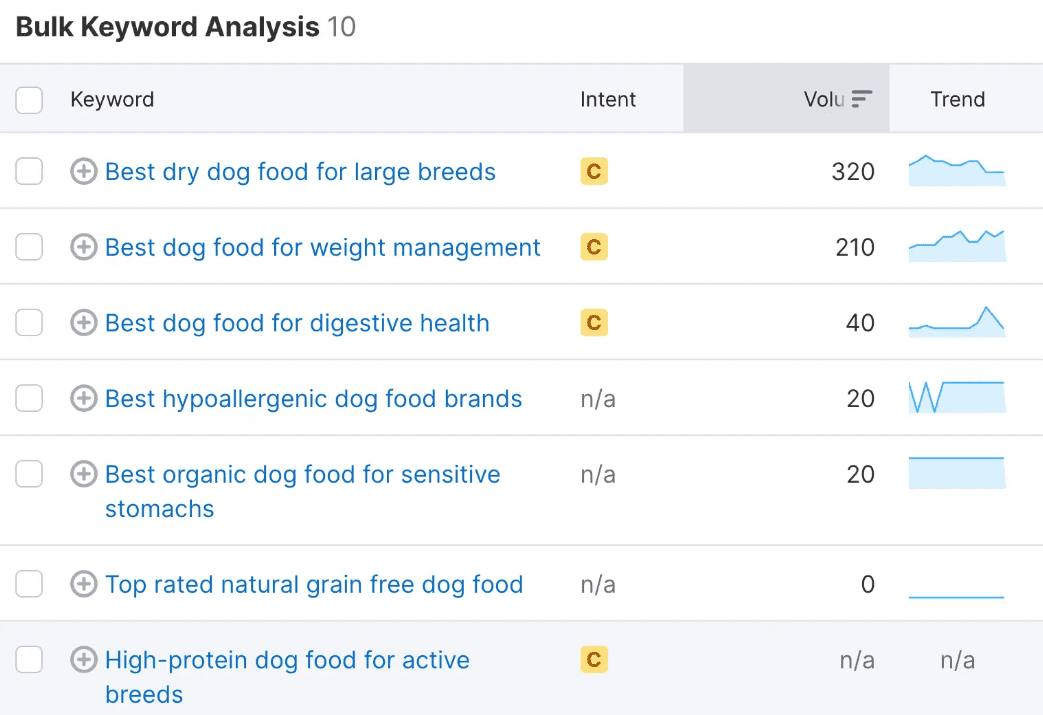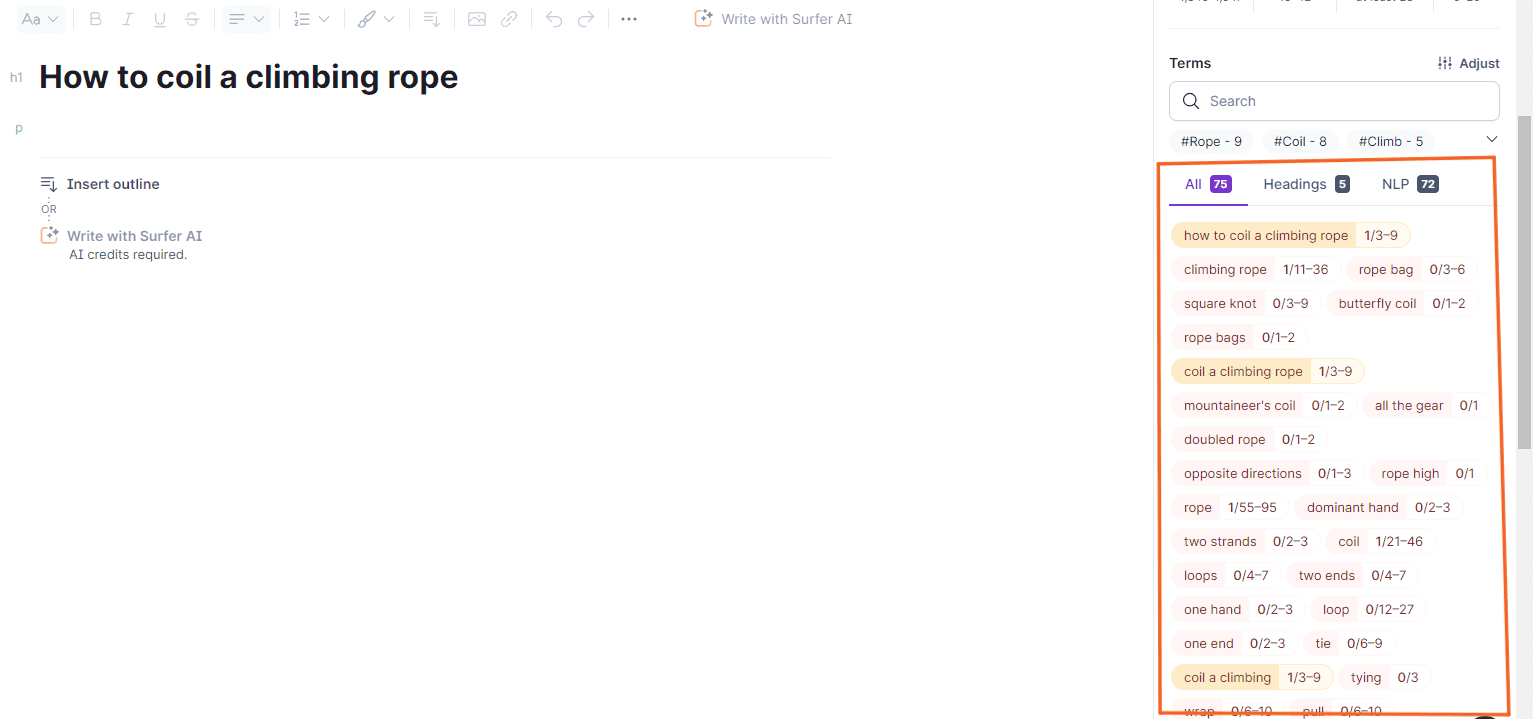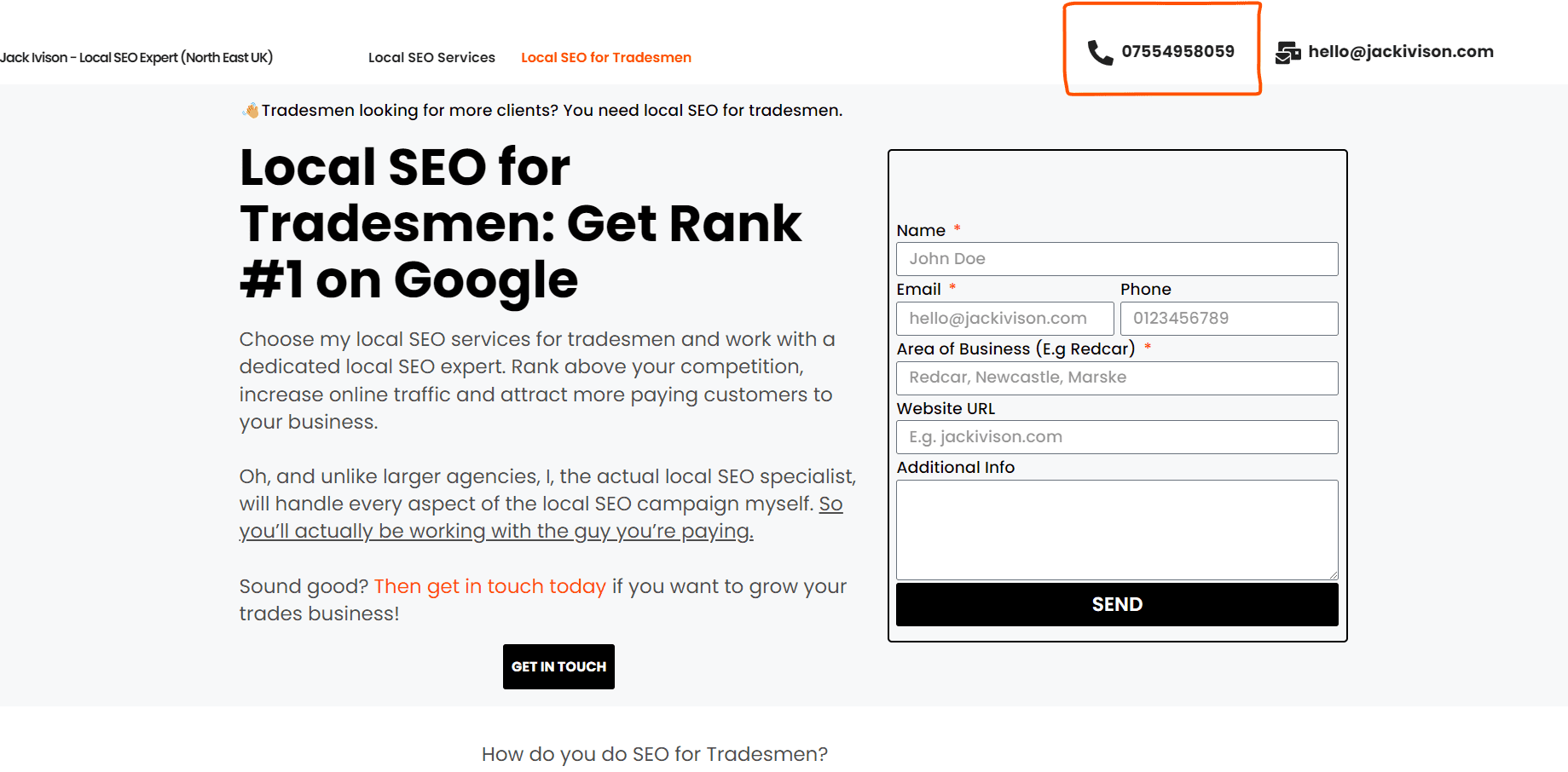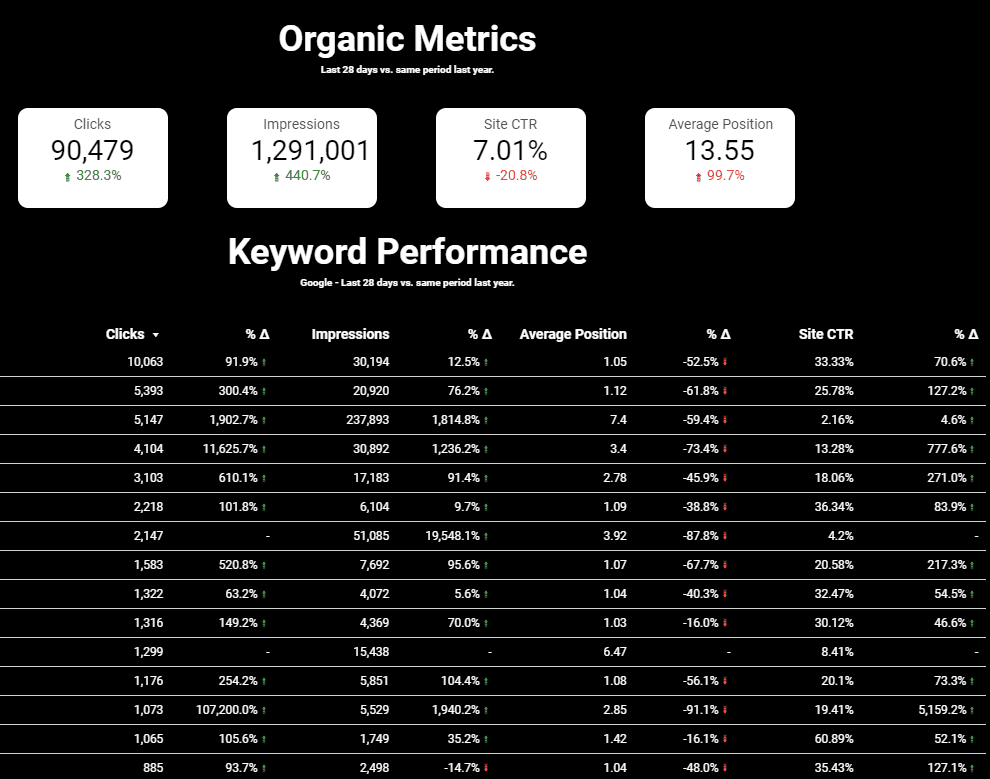SEO for Tradesmen: Get More Paying Clients
Don’t want to dive into how to do SEO for Tradesmen because managing your electrician business takes priority?
Consider partnering with me as your dedicated tradesmen SEO expert.
I’ll help boost your Google rankings to increase your visibility and attract more clients—whether you’re running the business solo or working as part of a team of electrical contractors.
Sticking around to learn how to DIY SEO? Keep on reading.
If you’re still reading cause you want to try your hand at the complicated process of SEO & local SEO, then let’s dive in.
First, what is SEO?
What Exactly is Search Engine Optimisation?
SEO, short for Search Engine Optimisation, involves a series of ongoing strategies to enhance a website’s visibility in organic search results.
When executed well, SEO elevates your site’s position in search rankings when potential customers search for products or services related to your business, making it easier for them to discover you than your competitors.
This boost in visibility results in increased website traffic and, with the right call to action, more sales and leads.
What is Tradesmen SEO?
So, what is Tradesmen SEO?
Tradesmen Search Engine Optimisation (SEO) involves optimising your website to rank for target keywords (search terms/search queries your target audience put into Google) that are specifically relevant to the clients you want phoning your mobile to inquire about your small business.
Relevance is crucial here; the more relevant the keywords you’re ranking for, the better qualified the visitors to your page will be.
And here’s the part you care about:
This targeted approach can lead to higher conversion rates, meaning more money in your pocket.
The Annoying Part (For You)
Google uses over 200 ranking factors to determine what website should rank and in what order, so it can be hard to figure out what you should or shouldn’t be doing if you’re not an SEO geek like me.
This is why tradespeople who are serious about their business hire local tradesmen and SEO experts to handle this intense process.
But even then, I think every tradesman should know what SEO best practices and a real SEO process look like.
That way, when you’re ready to find a partner (or prepared to brave it alone gulp), you’ll know exactly what to look for.
Why is SEO Important for Tradespeople?
You can use typical tradesmen’s digital marketing strategies to improve online visibility and attract potential customers looking to find local businesses like yours.
The typical strategies that come to mind are Facebook ads, Twitter posts, and YouTube ads, as well as pushing poorly designed leaflets through the door to get more qualified, high-quality leads.
But with SEO up your sleeve (and an SEO pro to do the work for you), you don’t have to twerk on TikTok to get the leads you want.
People are looking for trades businesses daily, whether for emergency plumbing, a new bathroom, they want to be installed, or they want a room re-decorating.
Take a look at the screenshot below:
In the UK, potential customers search Google for plumbing-related services 216,050 times a month.
A very, VERY high demand.
This means you’re missing out on ALL of this business if you don’t have a tradesmen SEO strategy focused on ranking for relevant keywords in your service area.
Not understanding computers is not a good enough excuse—and even if it were, do you really want to give more customers to your competitors?
No
Of course, you don’t.
Now, don’t get me wrong:
Traditional marketing methods, such as word of mouth or referrals, should and will be your #1 priority, as these leads are much easier to convert.
Especially if you’re in a low-pop, close-knit community like Redcar.
But after that, you need a primary channel that can send you prospective clients 24/7, 365 days a year.
So you can get more customers and propel your business forward.
And when done right
Traditional SEO & local SEO make that possible.
How To Do Tradesman SEO For Your Website
Let’s delve into what SEO Tradesmen entails; and the strategies I tend to employ within my tailored SEO campaigns ensure your business receives the visibility on Google it deserves.
You’re more than welcome to copy them for free for your own trade website, or you can just hire me to do it for you instead.
The choice is yours; lets go.
Perform Trades-Specific Keyword Research
Keyword research is the process of finding the right keywords to rank for in Google Maps (also known as the 3-pack or local pack) with your Google Business Profile (formerly Google My Business Profile) and traditional organic results pages.
These keywords can also be left aside for you to use if you ever decide to use Google Ads for your business.
However, this should be thought about down the line – or, in some cases, never.
As you can see here, just like in Monopoly, the idea is to occupy as much real estate as possible on the search engine results pages (SERPs)
So you can get your relevant & optimised content in front of as many eyes as possible.
This SEO marketing tactic aims to dominate the local search results, taking up as much space as you can
So you can get as many clicks as possible.
And you are leaving your competition with breadcrumbs.
We want to be at least in the top 3 on SERPs, along with the other places I just mentioned, if we want as much CTR as possible.
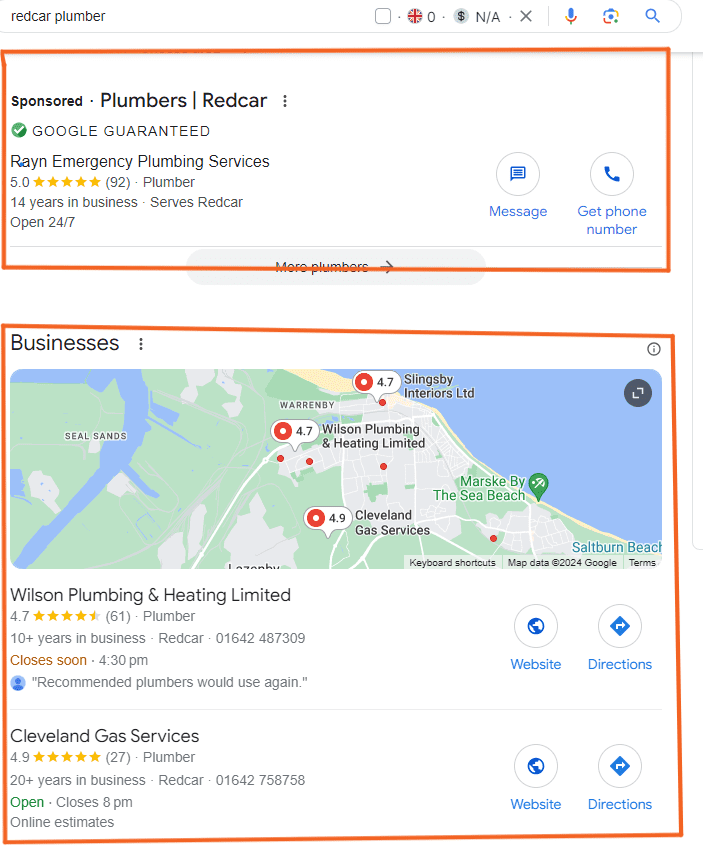
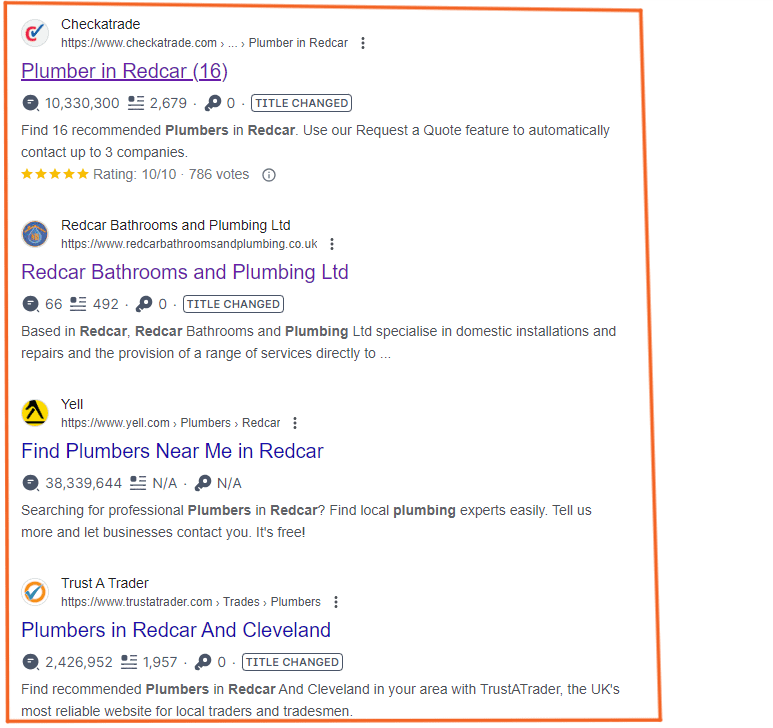
How to Conduct Keyword Research for Your Tradesmen Website
Now that you know why we want to conduct keyword research for a trade site, let’s discuss how.
Now, we don’t ever want to guess what keywords clients use to search on Google, especially when SEO professionals have access to all the data they need.
Note: The keyword data from such tools is NOT 100% accurate—however, it is data directly from Google, so it’s definitely worth using.
My current favourite keyword research tool is Semrush.
I use a few (the best free one is Google Keyword Planner), but this is the main one I’ll use today.
Here’s how to use this tool to find keywords that your target market is searching for this very second:
Open Semrush, go to the Keyword Magic Tool, and enter a broad phrase like “electrician [YOUR CITY]”.
For this example, I’m going to use my hometown, ‘Redcar’:
Semrush will then pump out keywords relevant to your local area and the phrase you entered:
Don’t worry about how you will optimise for these right now.
Your focus should be on collecting relevant keywords for which you can rank your business.
As well as making sure there is commercial intent behind the keyword you’re listing
(See the ‘Intent’ collum in the above screenshot.
The Big C implies it has commercial intent.
Just what we’re looking for.)
If you’re not sure how to find keywords with commercial intent, think like this;
If you, yes, you, search for something on Google, how would you search?
You’ll likely search if you’re looking for a repair shop for your mobile phone.
“repair shop near me” or “repair shop in X Town”.
The user intent is commercial, as you’re actively seeking a service.
Think this way when you’re trying to scope out the best keywords for your giant keyword list, which you’ll use to create the most relevant, high-quality web page on Google.
Doing so will give you some severe Return on Investment (ROI) when done correctly.
Tradesmen Keywords to Rank For
I’ve already mentioned that you should be looking to go after (rank) for commercial keywords.
This goes for most sites, but especially if you’re new to getting ranked on Google, you should look for low-competition keywords, as you’ll have a much easier time ranking.
And see much faster results.
As you build up your site’s authority, website ranking for more difficult (competitive) keywords will become much easier.
Though, you’ll have to research what is ‘easy’ or ‘hard’ with tools like SEM, as it can differ from city to city.
With that being said, here are some keyword combinations that typically have good search volume and MOSTLY easier to rank for on Google:
plumber + [CITY]
plumber near me
emergency plumber + [CITY]
HVAC repair + [CITY]
electrical services + [CITY]
24-hour electrician + [CITY]
residential electrician + [CITY]
commercial electrician + [CITY]
home renovation + [CITY]
carpentry services + [CITY]
roof repair + [CITY]
plumbing services + [CITY]
flooring installation + [CITY]
What To Do With Long-Tail Keywords
When you collect your massive list of keywords to use in the content, you may come across long, long-tail keywords.
These keyword phrases generally come in the form of questions (or ‘best X’, but are commercial); a keyword is considered a long tail if 3+ words make up the phrase.
But what should you do with these keywords?
99% of the time, since they are questions, you are going to want to save them for when you create blog content
These types of keywords tend to have informational user intent (minus the ‘buy X’ ones—who need the same care), requiring a long post to be properly answered.
While you’re not going to get conversions solely on the back of this content, it is an excellent way to get your target audience on your site and look at your work.
Also, these keyword phrases are generally considered ‘low-hanging fruit’ so you can quickly get some quick organic traffic.
Perfect for a new website or an old site looking to grow fast.
Optimise Your Trades Business Website for SEO
Now that you’ve got your low comp, commercial keywords on a massive spreadsheet (right?) that your clients are searching for everyday
It’s time to optimise your tradesmen website.
Optimise Your Website Structure
Often, website architecture and URL setup get mixed up.
So, let’s start by explaining what website architecture really involves.
Essentially, it’s about how you link web pages within your site.
A key element here is the use of your main navigation menu.
You want your primary trades services to be easily accessible in your website’s main navigation bar. These web pages usually focus on your primary services and key locations.
Linking these website pages is crucial because it boosts your website’s SEO by enhancing the crawling and indexing process and improving the user experience (UX).
On the other hand, URL structure deals with how you craft your URL (this is separate from internal linking & internal links).
Several URL structures could work, but here are the common ones I use depending on the tradesmen’s business size:
No Folders
This is my preferred method, and I’m using it for this blog post you’re reading.
Instead of dealing with multiple complex folders, everything branches directly from the root domain.
Although I HAVE used folders on this domain
But that’s for my portfolio and personal writing.
I wanted to keep these cognitively separate – more of a personal thing than a technical SEO aspect.
Folders
A folder-based structure can be effective if you aim to reach multiple locations.
Take a look at this example URL:
“find-a-plumber/redcar-and-cleveland/marske/”
This URL has the offering (Find a Plumber), the region (Redcar and Cleveland) and the location (Marske).
This is perfect if you’re going to have similar page offerings that are specifically for different locations.
That said, don’t get too caught up on what is right or wrong for you.
The key takeaway I want you to have on this optimisation process (and the rest of them);
Get your keyword in the URL, no matter the structure.
Create High-Quality Content
You’ll read it on this site, on another site, and everywhere else.
What am I talking about?
Content, of course!
I’m sure you’ve heard the phrase “Content is King” before
And whilst this cringy LinkedIn line is very annoying
It’s bang on the money.
Content creation isn’t just about blogs, though. It’s a broad term that applies to every page on your trades website, including service pages, company pages, blog content, and everything in between.
Each page will have its unique content framework to match the intent.
(We spoke about these earlier: informational, transactional, navigational and commercial)
What do I mean by a unique content framework?
For example, if you’re targeting “plumbers in Redcar,” you’ll want to build a service page that showcases your skills and has a conversion-focused design.
If you’re targeting “What is a piece of wood.”
Then, you’ll have a more informational design with graphics and videos to support your claims.
Unfortunately, many local trades businesses, like plumbing or electrical services, don’t get content marketing right. Often, they end up focusing on general informational keywords such as “What is a circuit breaker.”
This approach isn’t completely ineffective, but it’s only partially helpful.
Here’s what you need to do instead:
Avoid targeting keywords with a broad, national focus because A) they are tough to rank for and B) they aren’t specific to your service area.
Instead, try this content marketing strategy:
Focus on keywords that combine your specific trade services and your location.
For instance, if we were running an SEO campaign for a plumber in Middlesbrough, we might use keywords like:
What’s the Average Cost for Pipe Installation in Middlesbrough?
How Many Plumbers Are There in Middlesbrough?
The History of Plumbing in Middlesbrough
The Future of Plumbing: Technological Innovations from Middlesbrough Companies
The goal is to concentrate on topics that offer unique insights specific to Middlesbrough.
Avoid generic keywords like “What is a Pipe“ that don’t change based on location.
There needs to be a distinctive local twist to each keyword.
So you can: a) create content that better aligns with your audience and b) you can actually rank, so your writing time is worth it.
Wait! Don't forget On-page SEO
Being content-focused is excellent.
As you now know, content can reap all the rewards you could ever want from your business website.
However, this content is efficiently NULL if your SEO content needs to be optimised for SEO.
It would help if you did this BEFORE creating your SEO content.
But don’t worry! If you’ve already started writing, you can quickly change what isn’t quite right.
It’ll just be a little more annoying.
Here’s the process I’d follow if I were going to write some fresh content:
(Hint: this is the same process I’ve been following whilst writing this very page)
Use an On-page SEO tool
Go into Sufer SEO and enter your main keyword (the one you’ve harvested previously and put in your spreadsheet) into the “Content Editor.”
Once you’re in there, you’ll see the other keywords + NLP’s on the side that you should add to your blog.
You can use this to help generate an outline yourself (or your copywriter).
You can, of course, create the outline manually based on what you see on the right.
Or you could join the rest of us and get AI to do it for you.
Specially ChatGPT.
Here is the prompt I would use:
[NLP Keywords]
Once your content is properly optimised with the NLP keywords, you’ll want to ensure that the core on-page SEO elements are in place.
The primary keyword should be in the following:
URL
Title Tag/Meta Title
Meta Descriptions
H1 Tag
H2 Tag (a variation will do)
In the first sentence
In the last sentence
And once or twice throughout your content
And in your image alt text, if you can
What if you don't have an SEO tool?
Okay
What do you do if you don’t have an SEO content tool to give you juicy NLPs?
Get one.
But nah, seriously. You will have to write the best content you can without them.
You’ll naturally get NLPs into your content as you write since NLPs are essentially just variations of your primary keyword and related topics.
I recommend looking at your competition and copying their outline accordingly.
Since NLPs have likely influenced this, they have gathered information from SEO tools.
But your content isn’t going to fly as high as it could without your tool to guide you.
Mobile Optimisation for Trades Websites
Once you’ve perfected your content marketing for your trade business, providing an excellent user experience (UX) is crucial.
Two major factors affect UX significantly: how mobile-friendly it is (mobile compatibility -the experience) and loading speed.
The goal is to implement a responsive website design that works seamlessly across mobile, tablet, and desktop devices.
Your website should look good and be optimised for conversions so you can book as many clients as possible.
This includes placing your contact number prominently above the fold (often in the menu or just above it):
Additionally, make sure the phone number is clickable on mobile devices to maximise the potential for incoming calls.
Finally, invest in crafting an impactful homepage that effectively communicates your business’s value.
A potential client looking for your services should see your years of experience, past work, credentials (certifications, etc.), and, most importantly, Google reviews.
You want to make no mistake here;
You need to ensure they know you’re the best at what you do in your area.
Page Speed
Themes like Acabado immediately offer a responsive website design, which is a great starting point.
Nonetheless, it’s worthwhile to collaborate with a designer and web developer to ensure your web design is functional and practical.
Another vital aspect of technical SEO to consider is your site’s speed—in terms of how fast it loads.
You can check this by using tools like Google PageSpeed Insights.
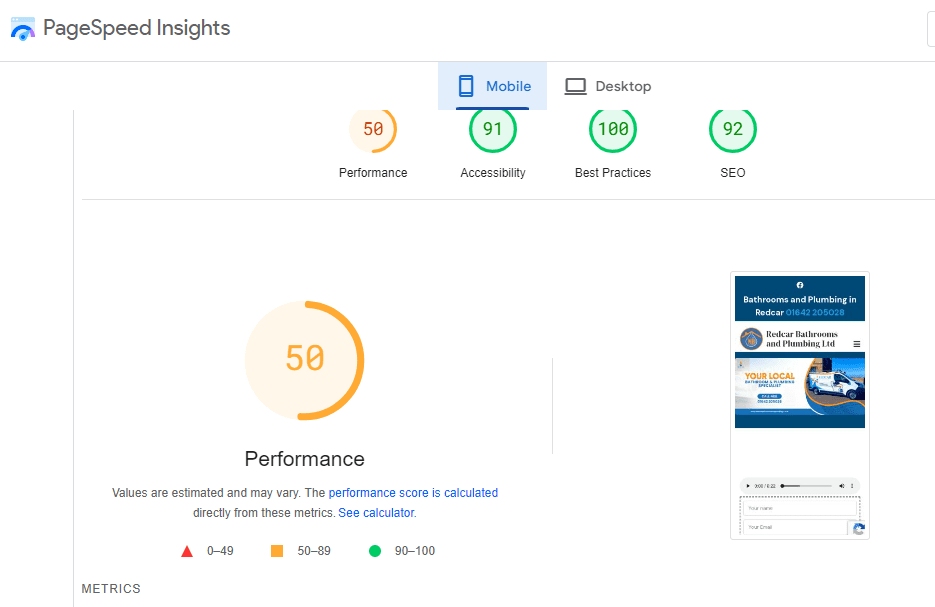
If your trade business’s website scores below 80, you must turn page loading into an entire project.
Even if your content is killer, you will fall short simply because of how fast this content will load.
We’re in the age of Twitter and TikTok now; people don’t want to sit around waiting for web pages to load (not like they ever really did anyway, but it has gotten worse)
The good news is that most marketing services can handle this for you.
Local SEO For Tradesmen
Your main goal for your local SEO strategy should be to achieve a top position in the local pack, which usually appears above the standard Google search engine rankings.
All the strategies you’ve picked up until now will impact your rankings in this local pack.
However, there are particular factors you specifically need to fine-tune:
How to Optimise Your Trades Business for Local SEO
Here are specific actions you need to take to maximise your local SEO performance:
1. Ensure You Have a Physical Address in Your Service Area
It might seem obvious, but having a physical location in the city you want to rank higher for is crucial.
Without this, your business might struggle to appear in local search results.
2. Set Up and Fine-Tune Your Google Business Profile
If you haven’t done so, create your Google Business Profile here.
Make sure to include comprehensive details about your services.
3. Develop a System for Gathering Customer Reviews
Use your Google Business Profile to create a review link, and share this with satisfied customers regularly.
Establishing a routine for collecting feedback can significantly enhance your reputation and SEO.
4. Utilise Local Keywords in Your Content
Although I’ve already discussed this, I want to reiterate it here: incorporate keywords that reflect your local area into your website content, blog posts, and metadata.
For instance, “emergency plumber in Redcar” or “roof repair services in Middlesbrough” would be great starting points for your home web page.
This helps search engines understand where your business operates and improves your relevance in local searches.
5. Ensure Consistency in Your NAP-W Details Across All Directories
NAP-W stands for Name, Address, Phone number, and Website.
(and potentially your email address)
Consistency in these details across online directories like Yelp and Yellow Pages is vital for local tradesman SEO success as it ensures every business listing lines up properly, so there is to be no confusion.
The final piece of this local SEO puzzle for a trade website is to grow your website through authoritative (and relevant) backlinks.
SEO Link Building for Trades Websites
Link building is the process
(the keyword here being ‘process’ – it’s not a get-rich-quick scheme type deal)
Of getting backlinks from other websites.
Typically, from sites with good domain authority (DA)
It’s undoubtedly one of the most important (if not THE MOST) important trade SEO ranking factors.
Getting the right links means improvements in search engine rankings.
However, it has to be done carefully
Or you risk your site crashing and burning like Wall Street.
Why?
Buying links or participating in other dangerous backlink-building methods is the most significant penalty risk to your SEO efforts.
The good news is that you can avoid such damages by using provenly safe link-building techniques that work.
Link Building Strategies for Trades Companies
The best and safest way to get links on the web is to publish content that people want to link to.
As I’ve discussed earlier, you have an idea of the content (assets) you should have on the site.
However, this is good for SEO but for acquiring backlinks
Not to so much.
Why? Because what you’ve likely created at this point is just service pages
While they are helpful commercially, they aren’t suitable for links because people have no reason to link back to them on their own website.
So, what assets should you be creating instead?
Well, you want to create valuable data-driven assets, free tools, or anything of value you think your local audience or other websites in the trade businesses will love.
Need help to come up with ideas? Here are a few I’ve come up with (that I’ll likely use in the future, so hurry):
DIY YouTube series
Post-Comparing Trades Tools
Interactive Map of Services Provided in Local Area
Cost Calculator for DIY Projects (tool)
Reviews of Local Hardware Stores
After that, you will want to look for opportunities outside of your brand.
Now, it is unlikely that people in the industry (i.e., your competition) will give you free backlinks.
So you’ll have to offer something of value.
Most of the time, this will be guest posts.
Other Off-Page SEO Tips
While I’ve covered the most important aspects of off-page SEO that you should focus on,
GMP optimising, local backlink building, Google reviews, guest posting, and local directory submissions
I want to mention some other off-page techniques that are not nearly as important but can serve you well.
Engage with Locals on Social Media
Proactively engaging on social media platforms can elevate your trades online visibility and reputation.
It won’t get you to the top of Google, but it is helpful.
Share valuable content regularly, such as DIY tips and client testimonials, to establish your expertise and trustworthiness, aligning with Google’s E-E-A-T guidelines.
Not only that but have some fun with it.
It doesn’t always have to be about ‘providing‘ content.
Though I would generally recommend posting what aligns with your business, you don’t want to get caught up in controversy.
Or make yourself look unprofessional.
Alternatively, ignore that and do whatever the RyanAir Twitter account does.
I’m not sure if they’re getting more flyers on their airline.
But their meme game is on point.
Pinterest (Forum Posting)
Brand Mentions
SEO Analytics and Reporting for Trades Businesses
The best SEO companies will set up or optimise your Google Analytics account for you, and if they are extra nice, they’ll also set up an SEO dashboard.
I know personally that I do this and set up Looker Studio for the client.
With Google Looker Studios, you can integrate Google Analytics data and Google Search Console and make the information much more digestible.
But how do you quantify your SEO results?
Understanding SEO Metrics
In an SEO campaign for your trade business, such as plumbing company or electrical work, tracking different key metrics to gauge performance and strategise effectively is crucial.
You need to do more than just look at if you rank higher or not.
Here’s a breakdown of the two main types of key metrics to monitor:
1. Leading Metrics: Indicators of Proactive Efforts
Leading metrics are within our control and should be actively managed. These include:
Creation of SEO Assets: This refers to how often you write content, such as blog posts or service pages.
Volume of Acquired Backlinks: Track the number of backlinks you secure from other websites, as these are essential for improving your site’s authority.
Both metrics should show consistent monthly growth, indicating proactive SEO efforts.
2. Lagging Metrics: Results from Past Actions
Lagging metrics reflect the outcomes of past SEO activities. They help you understand the effectiveness of your efforts over time. Key lagging metrics for local SEO include:
Impressions: The number of times your business listing has been seen on platforms like Google Business Profile.
Website Clicks: How many people click through to your website from various sources?
Phone Calls: The volume of calls received via your Google Business Profile, indicating direct customer engagement.
For broader SEO tracking, focus on
Organic Website Traffic: Monitored through Google Analytics, this measures visitors coming to your site from Google (and other search engines).
On-site Conversions: Includes tracking phone calls and lead form submissions to assess how well your site converts traffic into leads.
Impressions and Clicks: Data from Google Search Console that shows how often your site appears in search results and how many clicks it gets.
SEO Services for Tradesmen
You have two choices when it comes to executing an SEO campaign for your trades business;
First, you can DIY – I’ve given you everything you need to know to hit the ground running.
Or you can pay a professional and invest in trades SEO services.
If you decide to choose the latter, as you just want to hand it off and relieve yourself of the stress, then I’ve got a few things you should be looking out for when choosing an SEO agency to work with:
What to Look for in an SEO Agency for Tradesmen
There are many tradesmen, specialised SEO freelancers, and SEO agencies, but how do you sift through the garbage and find the right one?
A good start would be to ask them these questions:
What is your SEO process?
SEO is like a giant puzzle that includes many different pieces;
Figuring out the right keywords, analysing your SEO competitors, tweaking the technical aspects of your website, optimising the content on your website pages, creating engaging SEO content, developing assets that others will want to link to, and getting those valuable links from other sites.
If the SEO agency you’re talking to only mentions a couple of these tasks, they’re not giving you the complete package.
Think of it like plumbing work in a house.
The job is incomplete if a plumber installs the pipes but doesn’t connect them to the water supply.
Similarly, you can’t just focus on a few parts of an SEO marketing strategy and expect great results.
All these SEO elements must work together seamlessly for your website to thrive in the long run.
What’s your reporting like?
Watch out if an SEO agency only discusses analytics and dashboards but avoids discussing the specific deliverables it’s providing.
Many disreputable SEO firms engage in black hat practices.
Such companies might be overly secretive about their methods. If they use phrases like, “It’s proprietary” or “We can’t disclose our techniques,” it’s a red flag. A reputable SEO agency will be transparent, sharing your SEO campaign’s leading and lagging metrics.
How will we communicate?
Good SEO companies understand the importance of consistent and frequent communication.
If you’ve got an agency in mind and they are only interested in sending their report once a month, they don’t value transparency and client care.
SEO plans can change based on what might be going on with the site, so it’s important that any SEO informs you as often as possible—even if it’s to tell you that everything is running smoothly as planned.
Or just to wish you a happy weekend.
Don’t get left in the dark; hire someone who cares and communicates.
How Much Does SEO for Trades Businesses Cost?
A trades business operating in a major city (like Manchester) should expect to invest around £4,000 per month in local SEO services.
If your business is in a smaller town, like Redcar, the investment might be lower, around £1,000 per month.
The monthly SEO investment may need to be £10,000 or more for a trade business with multiple locations.
Again, this depends on these locations.
Conclusion: The Future of SEO for Trades Sector
Understanding SEO is crucial when selecting the right SEO company for your trade businesses. Similarly, you probably wouldn’t recommend that your clients fix complex plumbing or electrical issues independently.
The same principle applies to SEO.
You might be able to handle it yourself, but is it worth the risk and the potential loss of better opportunities?
That’s a question you’ll need to consider for your business, but I’m here to assist if you seek professional help.
Why Choose My SEO Services?
Choosing me and my SEO for tradesmen services means entrusting your trades business to a local lad who genuinely cares about your success.
As a one-man band, you’ll have direct access to the 6+ years of experience you’re paying for, ensuring personalised attention and tailored strategies – I won’t be palming you off to inexperienced juniors or other freelancers under me; which plenty of ‘professionals’ in this area do.
With real-world experience working with global brands, I bring a wealth of knowledge to the table, making conquering the local market a manageable task.




